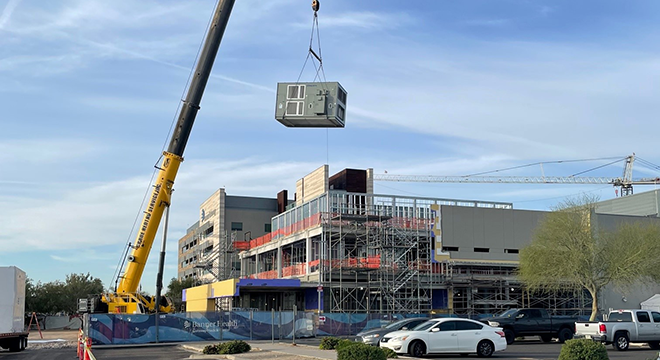How Modular Construction Benefits the Healthcare Industry

In December, CoStar published an article about construction backlog being at a three-year high. One of the biggest areas of construction backlog is in healthcare, followed by infrastructure. This should come as no surprise – the onset of COVID-19 disrupted nearly every industry across the globe. That, in turn, kicked off some serious spending in the healthcare vertical, including investments in R&D, vaccine distribution, digital infrastructure and alternatives to traditional methods of treating patients (telehealth anyone?).
Optum recently surveyed more than 150 leaders across the healthcare industry to find out how current market forces affected their priorities and how they have changed over the past year. According to the survey, in 2021, healthcare industry leaders’ focus was on cross-collaboration across industry segments. They invested in infrastructure, data and analytics to help improve teamwork and strengthen communication among colleagues and patients. Those surveyed felt that the top three areas of progress made in the industry were:
- Infrastructure innovation by advancing interoperability, administrative simplification and staffing models.
- Care delivery innovation by reaching more consumers more easily and introducing new capabilities (that are actually adopted).
- Health ecosystem innovation by creating new value through partnering to combine resources and capabilities to improve agility.
Areas that were evolving at a slower rate included consumer engagement, learning how to capture, analyze and use data, and simplifying care payment and funding – for both patients and the industry.
How do you keep up with the urgent needs of healthcare at a time when construction projects are booked out, sometimes up to a year in advance? The answer is modular construction.
The Modular Building Institute defines modular construction as a process in which a building is constructed off-site, under controlled plant conditions, then assembled on location.
Modular construction was rarely used in healthcare a decade ago. Now, according to a study conducted by McGraw Hill Construction, 49% of all healthcare projects are modular (up from 37% in 2011). Structures that are repeatable and built off-site for modular include: Overhead electrical, vents, mechanical and plumbing work that can be factory built, then delivered and installed as one piece. The industry uses modular for structures that are repeatable and can be built off-site, including:
- Exam rooms
- HVAC
- Perioperative spaces
- Holding bays
- Fire protection
- Plumbing
- Bathrooms
- Patient-unit overhead utilities
- Headwalls
- Hospital patient rooms
This allows the healthcare industry to leverage the key benefits of modular:
- Cost: Building in a factory setting means more predictable schedules and fewer weather delays. Factory processes and standardization, quality controls, volume purchasing and in-house testing can result in up to 30 percent cost savings.
- Time: Modular construction streamlines processes and labor efficiency, resulting in 30 to 50 percent faster project completion than traditional construction. On-site development, utility and foundation work can proceed simultaneously when modules are manufactured off-site.
- Quality: Building in a factory setting puts standardized processes and controls in place and leverages volume purchasing and in-house testing.
- Safety: Building in a controlled environment reduces accident risk, worker liability and weather-related delays, saving money and time.
- Flexibility: Modular units can be constructed to blend in with the external aesthetics of any existing structure. It can also be temporary — deployed when needed, then disassembled and relocated for new use, lowering the demand for raw materials and reducing the energy consumed to fulfill the new need.
- Environmental Impact: Building off-site in a factory can reduce waste by up to 90 percent and require 60 percent less energy than traditional construction methods. It also reduces daily traffic to and from the site and the noise and disruption that accompany it, especially if the project is taking place at an existing facility. Waste material from modular construction projects can also be used on future projects or recycled instead of being thrown into a dumpster.
The key to a successful modular project is planning for it up front — having an experienced project management team and engaging them as early as possible to reap its benefits. Learn more about TDIndustries' modular capabilities.
More from the Blog
7 Key Reasons to Explore Modular Construction
Dynamic economic conditions, and explosive growth in data center and semiconductor manufacturing and...
Save Lives with Heat Illness Prevention and Awareness
In the Southwest where TDIndustries works, checking the weather for dangerous heat and humidity...
What's Driving Modular Data Center Growth?
It’s that time of year when the 2023 research, market data and trends are published, providing hope and...
Subscribe to our blog
Please provide your email address to subscribe!
